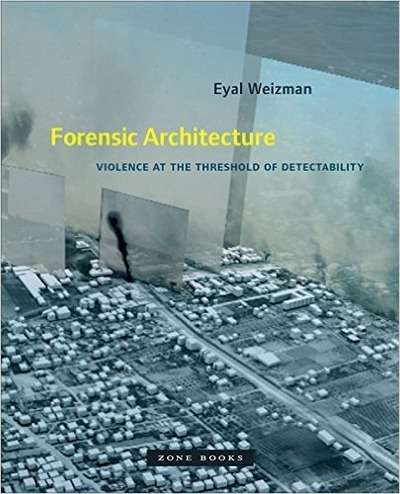Forensic Architecture : Violence at the Threshold of Detectability

Editorial Zone
Fecha de edición mayo 2017 · Edición nº 1
Idioma inglés
EAN 9781935408864
368 páginas
Libro
encuadernado en tapa dura
Resumen del libro
In recent years, a little-known research group called Forensic Architecture has begun using novel research methods to undertake a series of investigations into human rights abuses. Today, the group provides crucial evidence for international courts and works with a wide range of activist groups, NGOs, Amnesty International, and the UN. Forensic Architecture has created a new form of investigative practice, using architecture as an optical device to investigate armed conflicts and environmental destruction.
In Forensic Architecture, Eyal Weizman, the group's founder, provides an in-depth introduction to the history, practice, assumptions, potentials, and double binds of this practice. Weizman has collected an extensive array of images, maps, and detailed documentation that records the intricate work the group has performed across the globe. Weizman offers Forensic Architecture case studies that include the analysis of the shrapnel fragments in a room struck by drones in Pakistan, the resolution of a contested shooting in the West Bank, the architectural reconstruction of a secret Syrian detention center from the memory of its survivors, a blow-by-blow account of a day-long battle in Gaza, and an investigation of environmental violence in the Guatemalan highlands.
With these case studies, Weizman explains in image and text how the Forensic Architecture team uses its research and investigative methods to confront state propaganda and secrets and to expose ever-new forms of state violence. Weizman's Forensic Architecture, stunning and shocking in its critical narrative, powerful images, and daring investigations, presents a new form of public truth, technologically, architecturally, and aesthetically produced.
Biografía del autor
Eyal Weizman (Haifa, 1970). Es un arquitecto israelí, que reside entre Tel Aviv y Londres. Ha ejercido como profesor titular en el Goldsmith College y en el Bartlett School of Architecture (ambos en Londres), así como en la Universidad de Artes Aplicadas de Viena y en el Technion (Instituto Tecnológico de Israel) en Haifa. Igualmente, ha sido director del Centre for Research Architecture y del proyecto Forensic Architecture, financiado por el Consejo Europeo de Investigación (ERC). En asociación con el arquitecto Rafi Segal, llevó a cabo la reconstrucción del Ashdod Museum of Art, inaugurado en 2003, al igual que diversos proyectos para el Itim Theatre Company y para el Tel Aviv Museum. La exposición y el catálogo A Civilian Occupation, The Politics of Israeli Architecture , que él mismo comisarió y editó, fueron prohibidos por la Asociación Israelita de Arquitectos, pero se mostraron posteriormente en la Storefront Gallery for Art and Architecture de Nueva York, en el Kunst-Werke Institute for Contemporary Art de Berlín y en el Witte de With Center for Contemporary Art de Róterdam, entre otros. Por otro lado, es uno de los fundadores del colectivo Decolonizing Architecture Art Residency (DAAR) y ha dirigido diversas investigaciones para la organización Bx{0026} x02019;tselem (Centro de Información Israelí para los Derechos Humanos en los Territorios Ocupados) sobre las violaciones de los derechos humanos vinculados con la arquitectura y el urbanismo en Cisjordania. Ha publicado varios libros, entre los que cabe destacar Hollow Land y The Least of All Possible Evils .








